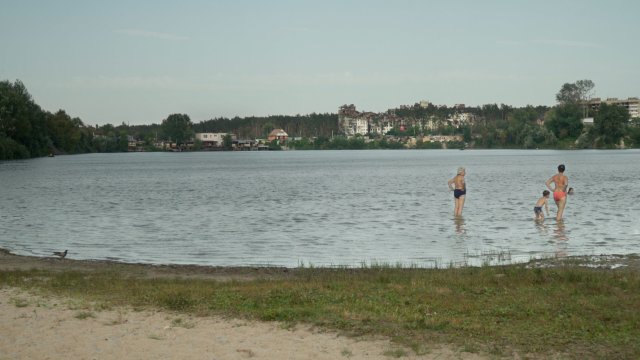Everyday life in war. Swimming in front of the backdrop of destroyed houses. It has to go on somehow.
Photo: © Christopher Nunn
At the Berlinale, two films are talking to each other that, even at second glance, have absolutely nothing to do with each other. In the documentary film “Favoriten” by Ruth Beckermann, the director accompanies an Austrian elementary school class with her camera over several years. Once in class the topic of war is discussed and a boy says he likes war because he thinks weapons are crazy. The teacher is of course horrified and explains to him how bad violence is. When asked whether he still thinks war is good, the boy answers: “Yes.” Then she asks him where he comes from: Macedonia. “Have you ever experienced war there?” “No,” the boy replies, and the teacher says the sentence of all sentences: “Then you can’t judge about it.”
In stark contrast, “Intercepted” (also in documentary form) tells exactly that: about war. The Ukrainian director Oksana Karpovych does not choose gruesome images from Butcha or Mariupol, which, based on what we have seen from Israel and Gaza, now rush past us like lights on a nighttime car ride. She lets words speak and makes it essentially impossible to avoid all the disgusting things that people can do to people.
nd.Kompakt – our daily newsletter

Our daily newsletter nd.Compact brings order to the news madness. Every day you will receive an overview of the most exciting stories from the world editorial staff. Get your free subscription here.
Karpovych curated phone calls from Russian soldiers home recorded by the Ukrainian secret service SBU, which the secret service posted online on its website, and accompanied them with long camera shots of destroyed houses, living rooms, schools and bridges from the contested areas of Ukraine. Sometimes she also chose everyday images of swimming in the lake in front of a backdrop of ruins, because otherwise you wouldn’t be able to last until the end.
What the soldiers tell their mostly female interlocutors testifies to the nature of war: dehumanization, propaganda, hatred, despair, helplessness and brutal violence. It’s about the fact that the Ukrainians have a much better standard of living than the Russians (financed by the West), that the soldiers have nothing to eat and sometimes have to grill a dog in order to get laptops (latest model) and New Balance sneakers that they took with them. The soldiers say that they were left alone by deserting troops or that they killed anyone who came across them (even if it was a mother with children) because these people could give away the troops’ position. There are also explicit reports of torture and forests full of corpses. Most of the time the conversations have no beginning and no end, they are more snippets of conversation than conversations, but Karpovych has cleverly organized them dramaturgically. She listened to 31 hours of recordings; most of the time the images match what is being told, unless they are about real atrocities. Then a curtain flutters timidly, moved by the draft blowing through the shot window glass. The images in combination with the words do not fail to have an impact. One thinks of Max Liebermann and his sentence: I can’t eat as much as I want to vomit. Always the question of why. And then you get answers, you don’t have to understand them, but you think you get it: If hate is the only allowed feeling in the world, then everything becomes easier. The Ukrainians refer to the callers either as enemies, targets or kokohls (Russian: wheat ferment, something like “potato” for Germans). When there is talk of killing, some people express satisfaction, relief and even fun (“I’ll shoot everyone in the head! I can finally do it now!”) in their voices. Other calls are testament to desperation and the massive discrepancy between those being burned at the front and those sitting at home in front of the propaganda television. When a soldier asks his mother, “What are we doing here?” We kill children!” And the answer is: “No, you kill fascists!” Then it is quite clear who is confronted with reality here and who is supposed to maintain the morale of war.
The question always remains as to whether these recordings are real. The Reuters news agency was at least able to find the phone numbers of the callers, but calls to these numbers went unanswered. The AP agency claims to have confirmed the authenticity of the recordings with the help of an organization in London financed by Russian dissident Mikhail Khodorkovsky. CNN is also said to have checked and confirmed its authenticity.
Even if none of that is true, “Intercepted” still tells you everything you need to know about war: Never again.
»Intercepted«: Canada/France/Ukraine 2024. Director: Oksana Karpovych, 95 minutes. Dates: February 21st, 10 a.m., Arsenal 1; 23.2. 12 p.m., Betonhalle@Silentgreen cinema.
Become a member of the nd.Genossenschaft!
Since January 1, 2022, the »nd« will be published as an independent left-wing newspaper owned by the staff and readers. Be there and support media diversity and visible left-wing positions as a cooperative member. Fill out the membership form now.
More information on www.dasnd.de/genossenschaft
